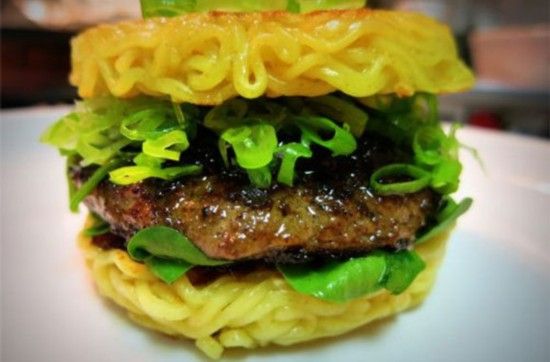
Burgers
汉堡
For years Matsumoto Kozo owned and ran a restaurant in Tokyo, cooking yoshoku, which is the Japanese word for the Western food that came to Japan over 100 years ago. Then Kozo got a chance to go to America and manage a couple of restaurants for Japanese investors. He moved to Los Angeles and lived in a strange little hotel called the Magic Castle, just a couple of blocks uphill from Hollywood’s tourist strip.
多年来,kozo在东京拥有并经营着一家餐馆,主营yoshoku,这是日语中对100多年前引入日本的西餐的称谓。之前kozo有机会来到美国,为日本投资者打理两家餐馆。他来到洛杉矶,住在名为魔法城堡的小旅馆,从好莱坞景区上坡,到旅馆只有两条街区。
One day there was a big barbecue party down by the pool. This was the early 1980s, and the glamorous, glittering, feline cast and crew of Cats were bunking at the Magic Castle, too. It was their day off. When they saw Kozo and his family come out of their unit, they insisted that he join the party. They were grilling burgers over an open flame. But it was 3 in the afternoon and Kozo had already eaten. So he asked if he could wrap up the burger to enjoy later. No way, the Cats said, you can’t save a burger like that. You’ve got to eat it here and now. It wasn’t his first hamburger—he’d eaten one before at McDonald’s in Tokyo and at MOS Burger, a Japanese chain. But this flame-grilled, all-beef patty was something categorically different.
有一天,在游泳池边组织了一场盛大的烧烤派对。当时是80年代初,当时歌剧《猫》的剧组人员正在参加派对。当看到kozo和家人走出房门,他们坚持kozo加入晚会。他们在篝火上烤汉堡。当时是下午三点钟,kozo已经吃了午餐。因此,他问是否允许他把汉堡打包稍后再吃。他们说不可以,你不能这样子保存汉堡,必须及时吃掉。这并不是他第一次吃汉堡,他之前在东京的麦当劳以及日本连锁店摩斯汉堡里都吃过,但这次的火焰烧烤、全牛汉堡完全不一样。
When he moved back to Japan a few years later, Kozo thought back to that afternoon at the Magic Castle. He found a place in a residential Tokyo district called Gotanda. It was big enough for a restaurant and a little garden. This was 1990. There were a handful of burger joints already in Japan, but they served burgers as a fast-food snack. (Now there are around 2,000 independent Japanese-run burger places, Kozo says.) He built a real restaurant with a station for grilling burgers in the middle. He enlisted the help of a friend to design a menu that was suitably American, printed on brown paper, with a logo that featured a chef holding a spatula and tossing a plate. He called it 7025 Franklin Avenue, the street address of the Magic Castle Hotel.
当几年后他回到日本,kozo想到了在魔法城堡的那个下午。他在东京的一个名为gotanda 的聚居区找到了一个地方,足够开个餐馆和一个小花园。那是1990年,日本已经有了几家汉堡连锁店,但他们只是把汉堡作为快餐来销售。(kozo说,现在日本已经有2000多家独立的汉堡店。)他开了一个餐馆,屋子中间有一个台子用于烤汉堡。他列出菜谱,一位朋友帮他设计了美国化的菜单。菜单印在棕色纸上,上面有个标识图案,显示一个厨师拿着铲子,摆弄着一个盘子。他把餐馆命名为富兰克林大道7025号,也就是魔法城堡在美国的地址。
Kozo still mans the grill nearly every day, though he does have a Nepalese chef who has been working by his side for years, and whose daughter cashiers and waits on tables. The cheeseburger I order, made from Australian beef, is simple and superior. The char is unmistakable, and the meat has a consistency and flavor, so familiar at home, that I have never seen replicated abroad.
虽然一个尼泊尔大厨已经在他身边工作了许多年,但kozo仍旧每天做着烧烤,大厨的女儿作为收银员和服务员。我点了一份干酪汉堡,由澳洲牛肉制成,简单却美味。烤的恰到火候,牛肉均匀,味道鲜美,像自己家里的味道一样。在国外我从未品尝过类似的汉堡。
I ask Kozo whether he’s been back to the Magic Castle or to the States since returning here in 1985. "I've never been back," he says, tears forming in his eyes. "I always wanted to go, but I haven't made it yet. Which is kind of amazing, since this whole business is thanks to America. This is what I found in America and wanted to bring back to Japan."
我问kozo1985年回国后,是否再回过魔法城堡或美国。“我再也没回去过”他眼中泛着泪花说。“我总想回去,但都没成行。这有点让人惊讶,因为我的所有生意都要归功于美国,我在美国发现了这种做法并且带到日本。”
n. 产品,农作物
vt. 生产,提出,引起,












